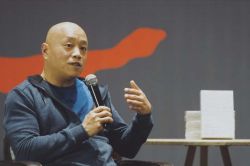“Huang Zhangjin”的版本间的差异
来自China Digital Space
(Created page with "==Huáng Zhāngjìn | 黄章晋== Huang Zhangjin (b. 1970) is a Chinese journalist and blogger. He has written for multiple well-known Chinese outlets and is the founder...") |
小 (文本替换 - 替换“Category”为“分类”) |
||
| (未显示1个用户的2个中间版本) | |||
| 第1行: | 第1行: | ||
==Huáng Zhāngjìn | [[黄章晋]]== | ==Huáng Zhāngjìn | [[黄章晋]]== | ||
| + | [[File:629.jpg|thumb|right|250px|''Huang Zhangjin ([https://m.thepaper.cn/kuaibao_detail.jsp?contid=3333475&from=kuaibao thepaper.cn])'']] | ||
| + | Huang Zhangjin (b. 1970) is a Chinese journalist and blogger. He has written for multiple well-known Chinese outlets and is the founder of Elephant Magazine (大象公会, [http://www.idaxiang.org/ idaxiang.org]), a popular new media platform that publishes articles about history and culture. Huang is a close friend of prominent Uyghur scholar [[Ilham Tohti]], and served for a time as an editor at Ilham's [https://chinadigitaltimes.net/2009/07/huang-zhangjin-%E9%BB%84%E7%AB%A0%E6%99%8B%EF%BC%9Athe-tale-of-eight-thousand-hunan-maidens-going-up-tian-mountain-12/ Uyghur Online] website. | ||
| − | + | Huang has written many articles about ethnic relations in Xinjiang, where he grew up. He has drawn attention to [https://chinadigitaltimes.net/chinese/662639.html discrimination suffered by Uyghur people in China]. He is a close friend with [[Ilham Tohti]], a prominent Uyghur scholar and economist who is currently serving a life sentence on separatism charges. When Ilham was [https://www.nytimes.com/2009/07/15/world/asia/15china.html detained after the Urumqi riots in July 2009], Huang wrote "'''[https://chinadigitaltimes.net/2021/02/translation-goodbye-ilham-by-huang-zhangjin/ Goodbye, Ilham]'''", introducing Ilham's views on ethnic relations to a Han audience: | |
| − | |||
| − | Huang has written many articles about ethnic relations in Xinjiang, | ||
<blockquote> Ilham insisted that Uyghur’s pursuit of equality and freedom must not be separated from Han people’s advancement of freedom and democracy. The two must be closely integrated. The situation of the Uyghurs was a result of the lack of democracy and freedom in China as a whole. Uyghurs can gain freedom and democracy only if Han people can also achieve them. | <blockquote> Ilham insisted that Uyghur’s pursuit of equality and freedom must not be separated from Han people’s advancement of freedom and democracy. The two must be closely integrated. The situation of the Uyghurs was a result of the lack of democracy and freedom in China as a whole. Uyghurs can gain freedom and democracy only if Han people can also achieve them. | ||
| 第12行: | 第12行: | ||
I highly doubt that there existed a Han scholar or a Han official who had ever thought of these issues like Ilham did. ['''[https://chinadigitaltimes.net/2021/02/translation-goodbye-ilham-by-huang-zhangjin/ English]''']</blockquote> | I highly doubt that there existed a Han scholar or a Han official who had ever thought of these issues like Ilham did. ['''[https://chinadigitaltimes.net/2021/02/translation-goodbye-ilham-by-huang-zhangjin/ English]''']</blockquote> | ||
| + | CDT has translated two of Huang's longform blog posts in full: [https://chinadigitaltimes.net/2021/02/translation-goodbye-ilham-by-huang-zhangjin/ Goodbye, Ilham], quoted above, and [https://chinadigitaltimes.net/2009/08/huang-zhangjin-%E9%BB%84%E7%AB%A0%E6%99%8B%EF%BC%9Athe-tale-of-eight-thousand-hunan-maidens-going-up-tian-mountain-22/ Please Tell Them, Yahximusiz]. | ||
==== CDT Coverage ==== | ==== CDT Coverage ==== | ||
| 第18行: | 第19行: | ||
*[https://chinadigitaltimes.net/chinese/tag/%e9%bb%84%e7%ab%a0%e6%99%8b 中文] | *[https://chinadigitaltimes.net/chinese/tag/%e9%bb%84%e7%ab%a0%e6%99%8b 中文] | ||
| − | [[ | + | [[分类:People]] |
2023年8月7日 (一) 05:01的最新版本
Huáng Zhāngjìn | 黄章晋

Huang Zhangjin (b. 1970) is a Chinese journalist and blogger. He has written for multiple well-known Chinese outlets and is the founder of Elephant Magazine (大象公会, idaxiang.org), a popular new media platform that publishes articles about history and culture. Huang is a close friend of prominent Uyghur scholar Ilham Tohti, and served for a time as an editor at Ilham's Uyghur Online website.
Huang has written many articles about ethnic relations in Xinjiang, where he grew up. He has drawn attention to discrimination suffered by Uyghur people in China. He is a close friend with Ilham Tohti, a prominent Uyghur scholar and economist who is currently serving a life sentence on separatism charges. When Ilham was detained after the Urumqi riots in July 2009, Huang wrote "Goodbye, Ilham", introducing Ilham's views on ethnic relations to a Han audience:
Ilham insisted that Uyghur’s pursuit of equality and freedom must not be separated from Han people’s advancement of freedom and democracy. The two must be closely integrated. The situation of the Uyghurs was a result of the lack of democracy and freedom in China as a whole. Uyghurs can gain freedom and democracy only if Han people can also achieve them.
[...] For many of Ilham’s interests and opinions, all I could do was listen, as I knew nothing about them. He once said hypothetically that, if separatism were still to gain more ground among Uyghurs when China became a liberal democracy, they might borrow from the Republic of Tatarstan, which through the constitution and a series of systemic arrangements stayed within Russia; there were no separatist parties to gain regional control. He also carefully studied the experience of Chinese people in Malaysia, as well as the handling of ethnic relations in Singapore and Europe.
I highly doubt that there existed a Han scholar or a Han official who had ever thought of these issues like Ilham did. [English]
CDT has translated two of Huang's longform blog posts in full: Goodbye, Ilham, quoted above, and Please Tell Them, Yahximusiz.




